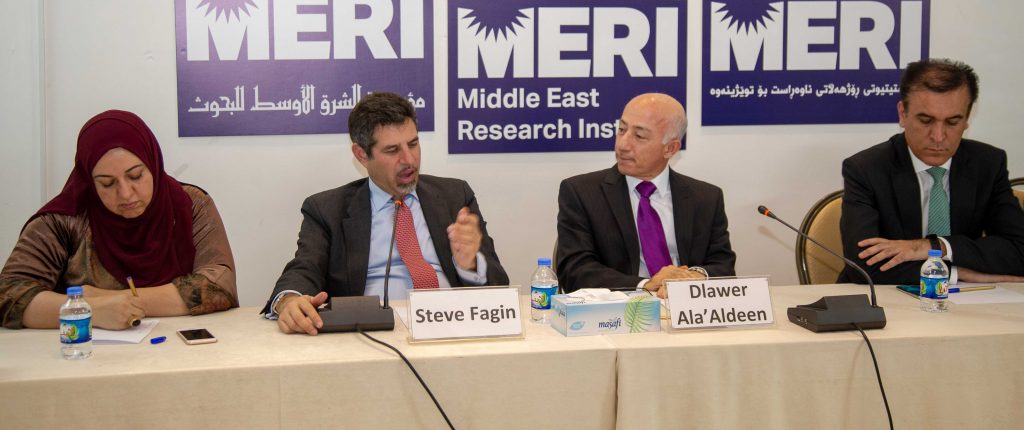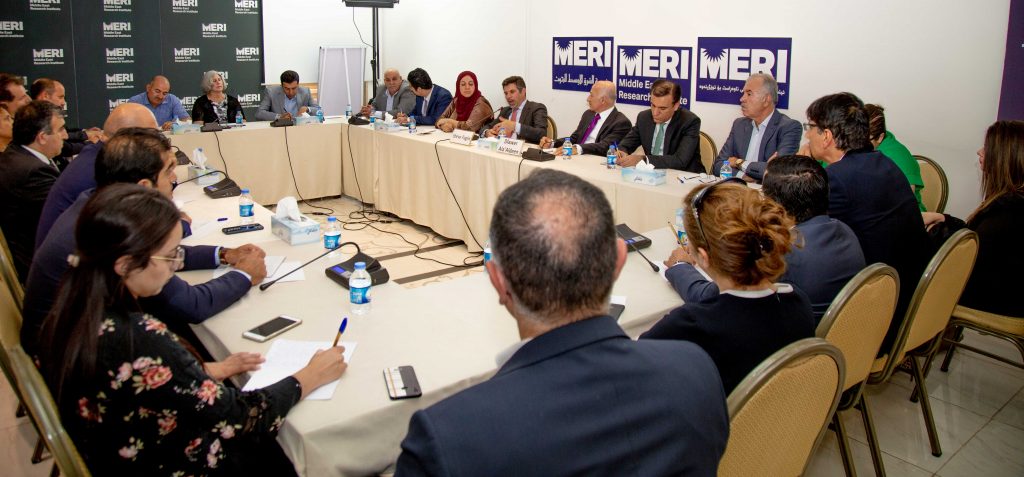On Wednesday, 26th June 2019, the Middle East Research Institute (MERI) convened a roundtable to discuss key issues related to Iran’s nuclear deal, the recent Iran-US tensions, and the impacts on Iraq and its Kurdistan Region. During this candid and stimulating debate, participants attempted to decipher the complex security, economic and political dynamics.
It is clear that the current US administration has identified several fundamental issues related to the Joint Comprehensive Plan of Action (JCPOA), otherwise known as the ‘Iran nuclear deal’. In particular, the deal is not linked to non-nuclear security issues, including the spread of Iran’s influence across the Middle East.
Iran’s support to armed non-state actors in Iraq, Syria, Lebanon, and Yemen has become a serious concern for the US and its allies in the region. Many of these non-state actors are believed to have acquired access to increasingly sophisticated military technologies, including middle-range ballistic missiles. The use of such missiles by the Houthis of Yemen against targets in the Kingdom of Saudi Arabia is one example. Iran-backed Hezbollah in Lebanon and Iraq’s Hashd Al-Sha’abi are operating transnationally and capable of threatening (or attacking) the regional US military presence or its allies, such as the state of Israel and the Gulf Arab countries.
From the group discussion, it also became clear that the US administration is not looking to provoke Iran into a war but to negotiate an alternative deal to bring Iran under overall security compliance and bring about a new regional ‘Order’. The US administration would consider this an ideal outcome to avoid the possibility of escalation into violent conflict. The US is playing a long game to allow for economic pressure to convince Iran to negotiate again. To date, Iran has rejected any offer to re-negotiate the nuclear deal and has not restrained its proxies in the region.
From Iraq’s perspective, the Baghdad and Erbil governments find themselves in difficult positions amidst these tensions between these global and regional powers. The US fully understands that Iran shares a long border with Iraq and the Kurdistan Region of Iraq (KRI) and that there are degrees of economic inter-dependence, particularly on food and agricultural products. Most Iranian exports into Iraq and the KRI are not subject to sanctions, and trade is continuing.
The US wants Iraq and the KRI to have friendly relations with Iran; however, they also have serious concerns about illegal (sanction-evading) trade between the two countries, particularly in the area of energy. The US is also concerned about the open and friendly relationship between Iraq’s various political parties and the Iranian Revolutionary Guard Corps which was added to the list of Foreign Terrorist Organizations by the US Government in April, 2019.
The US decision to evacuate non-essential personnel from Iraq and the KRI is also viewed as an issue of local concern. Undoubtedly, this decision was not taken lightly by the US with its strong partnerships with Iraq and the KRI in many areas, including the fight against the so-called Islamic State. The US relation with the KRI is considered unique in the world because the US has not historically had such relations with any other federal ‘Region’ or sub-state entity. The participants emphasised the necessity to build on this mutually rewarding relationship over the long term, while also being sensitive to the complexity of the global and regional security dynamics.
This event was conducted under Chatham House Rules
List of participants:
- Amanj Raheem, Cabinet Secretary, KRG
- Anwar Anaid, Professor, University of Kurdistan – Hawler
- Ari Mamshae, Advisor to the Deputy Speaker of the Parliament
- Dara Khailany, Advisor, Deputy Prime Minister.
- Dawood Atrushi, Ministry of Higher Education
- Dyar Khafaf, Council of Ministers
- Fereydoon Rahmani, York University – Canada
- Hemin Najmadden, Office of Coordination and Evaluation, KRG
- Hoshyar Siwaily, KDP Foreign Relations
- Jabar Yawar, Secretary General of the Ministry of Peshmerga
- Karwan Gaznayi, Member, Kurdistan Parliament, PUK
- Khidher Domle, University of Duhok
- Merle Jacobs, York University – Toronto, Canada
- Nahro Zagros, Vice President, Soran University
- Rewaz Fayaq, Member, Kurdistan Parliament
- Silvia Eiriz, Political/Economical Section Chief, US Consul General – Erbil
- Shokhan Qadir, University of Soran
- Steven Fagin, US Consul General, Erbil
- Tanya Gilly Khailany, SEED Foundation
- Yadgar Fayeq Saeed, Kurdistan 24 News Channel
From MERI:
- Dlawer Ala’Aldeen, President
- Fuad Smail, Director of Human Resources
- Kamaran Palani, Research Fellow
- Amez Smail, Research Intern
* * * * *
About MERI: The Middle East Research Institute is Iraq’s leading policy-research institute and think tank. It is an independent, entirely grant-funded not-for-profit organisation, based in Erbil, Kurdistan Region. Its mission is to contribute to the process of nation-building, state-building and democratisation via engagement, research, analysis and policy debates.
MERI’s main objectives include promoting and developing human rights, good governance, the rule of law and social and economic prosperity. MERI conduct high impact, high quality research (including purpose-based field work) and has published extensively in areas of: human rights, government reform, international politics, national security, ISIS, refugees, IDPs, minority rights (Christians, Yezidis, Turkmen, Shabaks, Sabi mandeans), Baghdad-Erbil relations, Hashd Al-Shabi, Peshmarga, violence against women, civil society. MERI engages policy- and decision-makers, the civil society and general public via publication, focused group discussions and conferences (MERI Forum)



